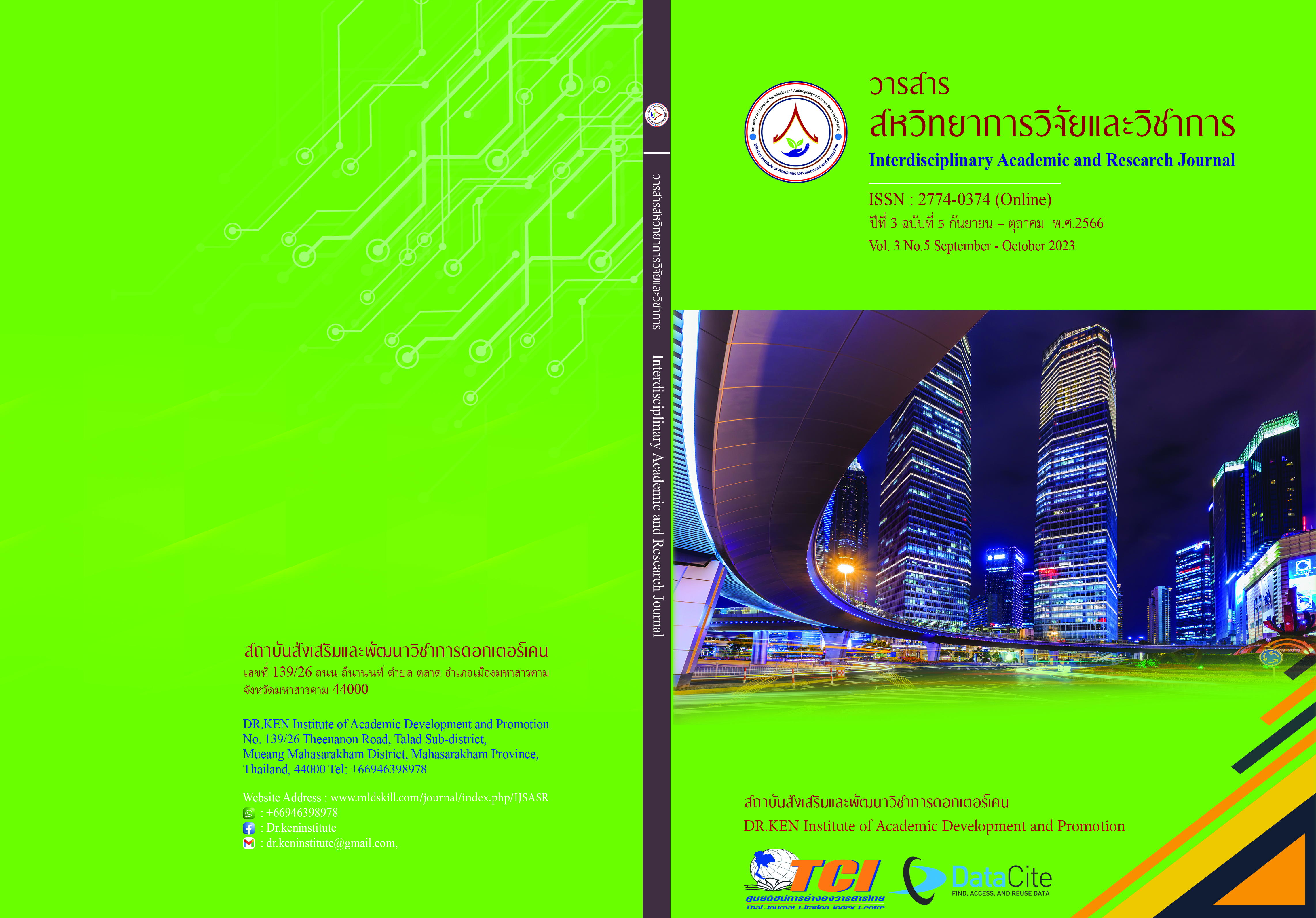Synthesis of Online Teaching Methods using Metaverse
DOI:
https://doi.org/10.14456/iarj.2023.273Keywords:
Learning Management; , Metaverse MediaAbstract
Good teaching requires the development of teaching materials by applying the concept of creative theory to the development of teaching and learning on the Internet network, creating online teaching materials in the 4.0 era. Metaverse is a term used to refer to virtual environments created by digital technology in which human representations, known as “avatars”, are created. In the virtual world, everyone will be able to interact and do activities together as in the real world. Therefore, it can be seen that Metaverse is an online teaching and learning medium suitable for the new normal situation which is moving from the situation of the COVID-19 epidemic. The purpose of this research was to synthesize an online learning management model using metaverse technology media. This is documentary research by a research source that is documented and research related to online learning using metaverse technology. Analyzing data by thematic analysis and descriptive presentation. The results showed that; The model for online teaching using Metaverse includes; (1) Immersive Learning Experience: Exploring Learning Regions in Historical Locations: Trials and practice: Language and Cultural Studies: Business transactions and learning: Traveling and exploring interesting things: (2) Adaptability and Problem-solving: New learning and adaptation: Complicated troubleshooting: Use of skills and knowledge: Proactive and Creative Thinking: Working with others: (3) Progressive Learning: Building things in the metaverse: Fixing issues in the metaverse: Learning at a student pace: Focus on the creation process: Giving Buildings and Valuables: Giving advice and following up: (4) Connectivity and Communication: Network Stability: Crystal clear audio and video: Various communication channels: Private communication area: Use of technologies that support communication: (5) Lifelong Learning: Lifelong learning: Skills to learn: Learn by interest: Learning every day: Using the Metaverse to Learn: (6) Engagement and Challenge: Games and activities with learning content: Giving a feeling of challenge: Provision of monitoring and progress monitoring: Variety of content and activities: Fun and challenging things: and Opening opportunities for further learning.
References
กรกช ขันธบุญ. (2565). รูปแบบการสื่อสารผ่านเมตาเวิร์สเพื่อการเรียนการสอน สาขาวิชานิเทศศาสตร์มหาวิทยาลัยสุโขทัยธรรมาธิราช. มนุษยสังคมสาร (มสส.). 20 (3), 123-144.
กฤษณพงศ์ เลิศบำรุงชัย. (2566). การสร้างจักรวาลนฤมิต Spatial Metaverse. Retrieved from: https://www.slideshare.net/kha00at/spatial-metaverse
จุฬารัตน์ บุษบงก์. (2565). แนวทางการจัดการเรียนการสอนออนไลน์ในยุคหลังความปกติใหม่. วารสารเทคโนโลยีและสื่อสารการศึกษา. 17 (22), 78-91.
ชัยณรงค์ บุญชื่น, ธีรศักดิ์ เชื้อหนองควาย และ ศิริกรณ์ กันขัติ์. (2566). การพัฒนาสื่อการเรียนรู้ 3 มิติ ผ่านเมตาเวิร์ส กรณีศึกษาคลองแม่ข่า. วารสารวิทยาศาสตร์และเทคโนโลยีสู่ชุมชน. 1 (2), 27-35.
ชัยณรงค์ บุญชื่น, ธีรศักดิ์ เชื้อหนองควาย และ ศิริกรณ์ กันขัติ์. (2566). การพัฒนาสื่อการเรียนรู้ 3 มิติ ผ่านเมตาเวิร์ส กรณีศึกษาคลองแม่ข่า. วารสารวิทยาศาสตร์และเทคโนโลยีสู่ชุมชน. 1 (2), 27-35.
ธนพรรณ ทรัพย์ธนาดล. (2564). ปัจจัยที่มีผลกระทบต่อการจัดการเรียนการสอนบทเรียนออนไลน์ ของมหาวิทยาลัยราชภัฎนครราชสีมา. Veridian E-Journal SU. 4 (1), 652-666.
ประยุทธ อัครเอกฒาลิน. (2564). การสื่อสารเคลื่อนที่ 5G และสายอากาศ. วารสารวิชาการพระจอมเกล้าพระนครเหนือ. 31 (2), 175-178.
พระมหาสมชาย ขนฺติสรโณ (2566). การประยุกต์ใช้เมตาเวิร์สเพื่อการส่งเสริมการเรียนรู้พระพุทธศาสนา เสมือนจริงในยุคดิจิทัล. วารสารวิชาการรัฐศาสตร์และรัฐประศาสนศาสตร์. 5 (2), 49-57.
พฤติกานต์ นิยมรัตน์ จุฑาทิพย์อาจไพรินทร์ ปุญชรัสมิ์วัชรกาฬ และ ชบาไพร รักสถาน. (2564). การเรียนการสอนแบบออนไลน์ภายใต้สถานการณ์การแพร่ระบาดของไวรัส COVID-19. วารสารวิชาการสังคมมนุษย์ มหาวิทยาลัยราชภัฏนครศรีธรรมราช. 11 (2), 1-16.
พวงเพชร นรทีทาน และ ธีรภัทร์ ถิ่นแสนดี. (2564). การจัดการเรียนการสอนออนไลน์ภายใต้สถานการณ์โรคอุบัติใหม่. วารสารวิชาการรัตนบุศย์(RATANABUTH JOURNAL). 3 (2), 84-91.
ภวิสาณัชช์ ศรศิริวงศ. (2564). ห้องเรียนเสมือนจริง. วารสารศึกษาศาสตร์ มหาวิทยาลัยศิลปากร. 19 (2), 81-93.
ภานุมาศ หมอสินธ์ ละอองดาว ทองดี อรรถพล หล้าสมบูรณ์ และ คำพันธ์ อัครเนตร. (2559). การสร้างสื่อการเรียนการสอนออนไลน์โดยใช้ทฤษฏีสร้างสรรค์นิยม ในยุคไทยแลนด์ 4.0. วารสารวิชาการสถาบันวิทยาการจัดการแห่งแปซิฟิค. 2 (2), 161-171.
วราพร บุญมี. (2564). สื่อการสอนกับการเรียนรู้ในศตวรรษที่ 21. วารสารการบริหารนิติบุคคลและนวัตกรรมท้องถิ่น. 7 (9), 373-386.
วิทยา วาโย, อภิรดี เจริญนุกูล, ฉัตรสุดา กานกายันต์, จรรยา คนใหญ่. (2563). การเรียนการสอนแบบออนไลน์ภายใต้สถานการณ์แพร่ระบาด ของไวรัส COVID-19 : แนวคิดและการประยุกต์ใช้จัดการเรียนการสอน. วารสารศูนย์อนามัยที่ 9. 14 (34), 285-293.
สำนักงานคณะกรรมการการอุดมศึกษา. (2561). แผนอุดมศึกษาระยะยาว 20 ปี พ.ศ. 2561 – 2580. กรุงเทพมหานคร: บริษัท พริกหวานกราฟฟิค จำกัด
สำนักงานมาตรฐานการศึกษาและพัฒนาการเรียนรู้. (2562). มาตรฐานการศึกษาของชาติ พ.ศ. 2561. นนทบุรี: บริษัท 21 เซนจูรี่ จำกัด.
Arxiden, A., & Wang, S., (2016). The Design of the Online Teaching System is based a on Multi-agent System. 2nd International Conference on Social Science and Technology Education (ICSSTE 2016). 123-127. DOI: 10.2991/icsste-16.2016.23
Gao, J. (2021). Practice and Exploration of Completely Online Network Teaching with ID3 Algorithm. In: Jan, M.A., Khan, F. (eds) Application of Big Data, Blockchain, and Internet of Things for Education Informatization. BigIoT-EDU 2021. Lecture Notes of the Institute for Computer Sciences, Social Informatics and Telecommunications Engineering, vol 392. Springer, Cham. https://doi.org/10.1007/978-3-030-87903-7_71
Humby, R. (2013). Tales from the virtual classroom: Planning the technology-enhanced learning environment for classroom leaders. 2013 International Conference on Current Trends in Information Technology (CTIT), Dubai, United Arab Emirates, 2013, 34-40, doi: 10.1109/CTIT.2013.6749474.
Pipitkul, P. (2008). “The Use of Second Life for Teaching and Learning in Library and Information Science”. Journal of Library and Information Science 14(2), 37-43.
Sarachan, J. & Reinson, K.F. (2011), "Public issues, private concerns: social media and course management systems in higher education", Wankel, C. (Ed.) Educating Educators with Social Media (Cutting-Edge Technologies in Higher Education, Vol. 1), Emerald Group Publishing Limited, Bingley, pp. 227-244. https://doi.org/10.1108/S2044-9968(2011)0000001014
Downloads
Published
How to Cite
Issue
Section
License
Copyright (c) 2023 Busara Niyomves

This work is licensed under a Creative Commons Attribution-NonCommercial-NoDerivatives 4.0 International License.
Copyright on any article in the Interdisciplinary Academic and Research Journal is retained by the author(s) under the under the Creative Commons Attribution-NonCommercial-NoDerivatives 4.0 International License. Permission to use text, content, images, etc. of publication. Any user to read, download, copy, distribute, print, search, or link to the full texts of articles, crawl them for indexing, pass them as data to software, or use them for any other lawful purpose. But do not use it for commercial use or with the intent to benefit any business.
















.png)


